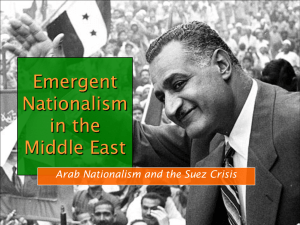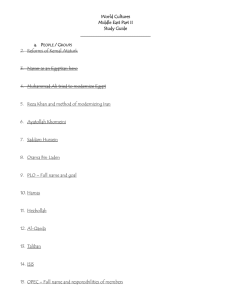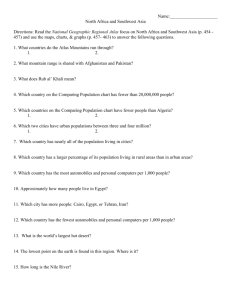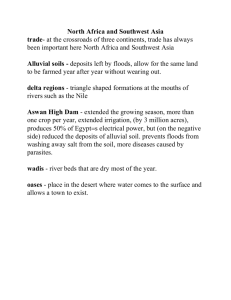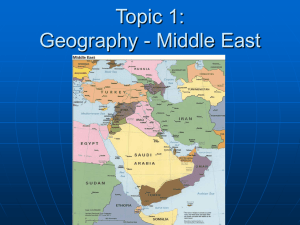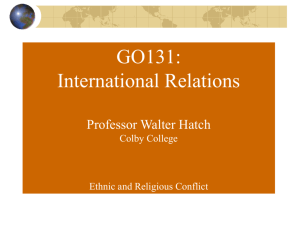31.3 Nationalism in the Middle East and North Africa
advertisement
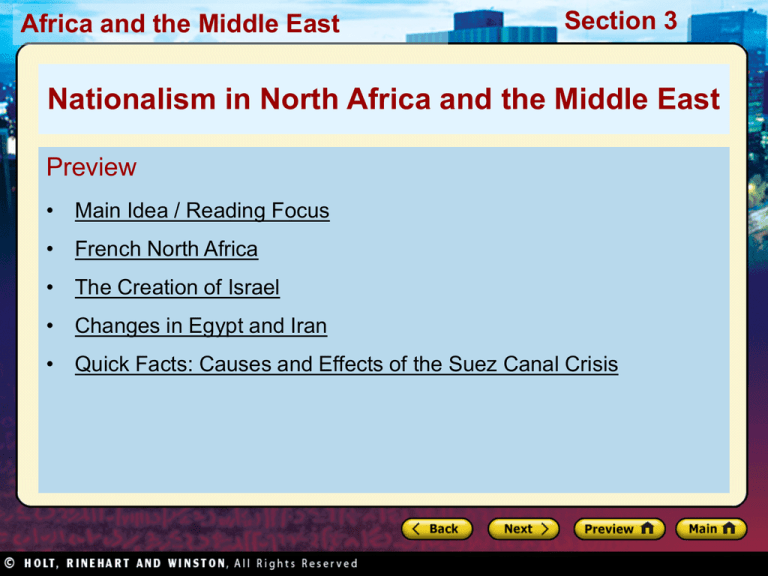
Africa and the Middle East Section 3 Nationalism in North Africa and the Middle East Preview • Main Idea / Reading Focus • French North Africa • The Creation of Israel • Changes in Egypt and Iran • Quick Facts: Causes and Effects of the Suez Canal Crisis Africa and the Middle East Section 3 Nationalism in North Africa and the Middle East Main Idea The rise of nationalism in North Africa and the Middle East led to independence for some countries and to conflicts with the West. Reading Focus • How did independence come to French North Africa? • What events led to the creation of Israel? • How did nationalism cause changes in Egypt and Iran? Section 3 Africa and the Middle East French North Africa After World War II, France faced growing nationalist movements in its North African protectorates of Morocco, Tunisia, and Algeria. Morocco and Tunisia • Nationalist campaigns for independence began to grow in early, mid-1900s in both countries • Attempts by France to crack down on movements led to increasing unrest, demonstrations, guerrilla wars • Meanwhile Algeria also struggling for independence Independence • Algeria home to large French settler population, was more important to the French • French government concluded it could not fight guerrilla wars in Algeria, Morocco, Tunisia at same time • Negotiated with nationalist leaders in Morocco, Tunisia • 1956, both countries granted independence Africa and the Middle East Section 3 Algeria Algeria • 1830, France first took control of some areas in Algeria • 1950s, more than 1 million European settlers in area, owned best land, dominated economy, had grip on political power National Liberation Front • 1954, group of Algerian nationalists formed National Liberation Front (FLN) • FLN began campaign of armed attacks against French targets • French responded with mass arrests, raids on Muslim towns Attacks on Settlers, Reprisals • Next year FLN directly targeted French settlers; attacks killed more than 100 people in one city • French forces, groups of settlers responded by attacking Muslims; between 1,200 and 12,000 Muslims killed in reprisal attacks Section 3 Africa and the Middle East French Responses Battle of Algiers Change in Government • Attacks set pattern for deadly war in Algeria—FLN targeted French civilians, French attacked Muslim population • French settlers in Algiers increasingly angry over perceived lack of support from French government • FLN launched campaign of bombings, assassinations at civilians, military in Algiers • May 1958, French troops, mob of settlers seized control in Algiers, demanded change of government in Paris • French responded with harsh counterterrorism campaign, torturing suspected FLN members • Summer 1957, FLN largely defeated, but war not over • Demands met; Charles de Gaulle appointed prime minister in June 1958 • De Gaulle seen as strong supporter of settlers of Algeria Africa and the Middle East Section 3 De Gaulle De Gaulle hoped to satisfy both French settlers, Algerian nationalists • Wanted to give Algeria limited degree of selfgovernment – Faced violent reaction from French settlers, who did not want France to give up any control – Violent reaction also from nationalists, wanted full independence • De Gaulle decided French rule could not be maintained in Algeria – February 1961, opened peace talks with FLN – 1962, signed agreement granting Algeria independence Africa and the Middle East Section 3 Contrast How was the struggle for independence in Algeria different from the struggle in Morocco and Tunisia? Answer(s): The French government negotiated with nationalist leaders in Morocco and Tunisia and allowed them independence, but fought the FLN to keep control of Algeria. Section 3 Africa and the Middle East The Creation of Israel • Nationalism led to the creation of Israel • Late 1800s Jewish nationalist movement of Zionism growing • Jews calling for an independent state in ancient homeland British Mandate of Palestine • After World War I, League of Nations gave Britain control over Palestine, required Britain to make preparations for Jewish homeland • After World War II, Jewish leaders in Palestine pressed British to create Jewish state End of British Mandate • 1947, Britain announced it was giving up control of mandate, turning matter over to the UN • UN proposed to partition, or divide, Palestine into Jewish state and Arab state with Jerusalem under international control Jewish leaders accepted the proposal, but Arabs did not. Despite Arab objections, the UN passed a resolution supporting the partition as valid. Section 3 Africa and the Middle East Independence and War • As British pulled out of Palestine, David Ben-Gurion, other Jewish leaders, declared birth of democratic State of Israel, May 14, 1948 • Ben-Gurion later became Israel’s first prime minister • Day after Israel declared independence, armies from Arab countries of Egypt, Syria, Lebanon, Transjordan, Iraq invaded Israel, launching first Arab-Israeli war No Arab State Gaza Strip, West Bank • War lasted from May to December; Arab armies soundly defeated • Both Israel, neighboring Arab countries seized, held land planned for new Arab state • Arab states negotiated cease-fire agreements, but would not sign permanent peace treaties • One result: Arab state proposed by UN did not come into existence • Egypt controlled Gaza Strip, Transjordan controlled territory west of Jordan River known as West Bank Africa and the Middle East Section 3 Refugee Problems Arab-Israeli war caused massive refugee problems • By end of fighting around 700,000 Palestinian Arabs had become refugees • Fled or expelled from areas that Israel took control of, as well as from general war, chaos • Jewish refugees fled Arab countries and resettled in Israel Africa and the Middle East Section 3 Summarize What events led to the creation of Israel as an independent state? Answer(s): 1947: Britain announced it was giving up control of the mandate; UN proposed to partition Palestine into a Jewish state and an Arab state; 1948: Jewish leaders declared birth of the State of Israel Africa and the Middle East Section 3 Changes in Egypt and Iran • Israel’s victory had effects throughout the Arab world. • The victory discredited many of the region’s leaders, and young nationalist leaders came to power in places such as Egypt and Iran. A New Government Farouk Discredited • 1922, Egypt gained formal independence from Great Britain • Egyptian King Farouk I strongly pro-British, seen as dependent on Britain for power • Many believed corruption in palace, parliament, army contributed to defeat • Egypt’s loss in first Arab-Israeli war discredited Farouk, leaders of Egypt’s parliament • Gap between rich, poor in post independence government also angered many Egyptians • However British troops occupied Suez Canal Zone • 1936 treaty allowed Britain to defend Egypt if attacked Growing Anger Africa and the Middle East Section 3 Nasser • Out of dissatisfaction came 1952 military coup led by 34-year old colonel Gamal Abdel Nasser; forced King Farouk out of power • Nasser, followers abolished monarchy, created single government party, undertook ambitious land reform program to gain support among poor Suez Crisis • Nasser became most important figure in Arab world after confrontation with Britain, France, Israel over Suez Canal • Suez Crisis had roots in politics of the Cold War • After Nasser came to power, refused to join Baghdad Pact, U.S.-led alliance against communism in Middle East Africa and the Middle East Section 3 Growing Crisis Dealing Arms • Nasser requested western countries sell him arms; they refused • Turned to Soviet-controlled Czechoslovakia, signed arms deal • U.S., Britain responded by refusing to loan Egypt money to build Aswan Dam Nationalizing the Canal • Nasser enraged that funding denied for building dam on Nile River • Decided to nationalize, take control of, Suez Canal, which was owned by international company controlled by Britain, France Growing Hostility • Nasser’s action celebrated as act of defiance by people in Arab world • British, French outraged by seizure of property • Hostility also growing between Egypt, Israel Section 3 Africa and the Middle East Pan-Arabism Attack on Egypt • October 1956, Britain, France, Israel launched coordinated attack on Egypt • Militarily defeated Egyptian forces • U.S. did not support actions, which created tensions with Soviet Union; pressured Britain, France, Israel to withdraw, which they did Nasser Popular in Arab World • Countries withdrew; Egypt left in control of Suez Canal • Suez Crisis had become great victory for Nasser • Nasser promoted PanArabism, or Arab unity • Brought Egypt, Syria together as United Arab Republic, but Syria withdrew two years later Section 3 Africa and the Middle East Conflict in Iran When Mohammad Reza Pahlavi became shah of Iran in 1941, British and Russian troops occupied parts of his country. Conflict in Iran Mosaddeq • British-run company also controlled Iran’s profitable oil industry, kept most of profits • 1951, Iranian parliament named Mosaddeq prime minister, voted to nationalize oil industry • Iranian nationalists determined to take control of country’s oil resources, reduce power of shah, establish constitutional monarchy • Britain, U.S. called for boycott of Iranian oil, preventing Iran from selling much on world market • Nationalists led by Mohammad Mosaddeq, opponent of foreign influence in Iran • Mosaddeq worked to reduce power of monarchy and placed army forces under control of government Section 3 Africa and the Middle East Coups Military Coup • Many military officers upset with reforms, joined coup to replace Mosaddeq Mosaddeq Overthrown • Coup successful • Mosaddeq overthrown, shah returned to power • Coup supported by U.S., Britain Reforms Reforms Opposed • Shah began ambitious program of reforms, including land and literacy, women’s rights • Shah continued to rule with iron hand, secret police • Iran’s industry, education, health care improved • Reforms opposed by conservatives as moving away from traditional Islamic values Africa and the Middle East Section 3 Africa and the Middle East Section 3 Find the Main Idea What changes occurred in Egypt and Iran, and how were they related to nationalism? Answer(s): Egypt—Nasser overthrew King Farouk, who was seen as too pro-British; promoted Pan-Arabism; Iran—nationalized oil industry; U.S. and Britain supported overthrow of Shah Mosaddeq, who had opposed foreign influence
